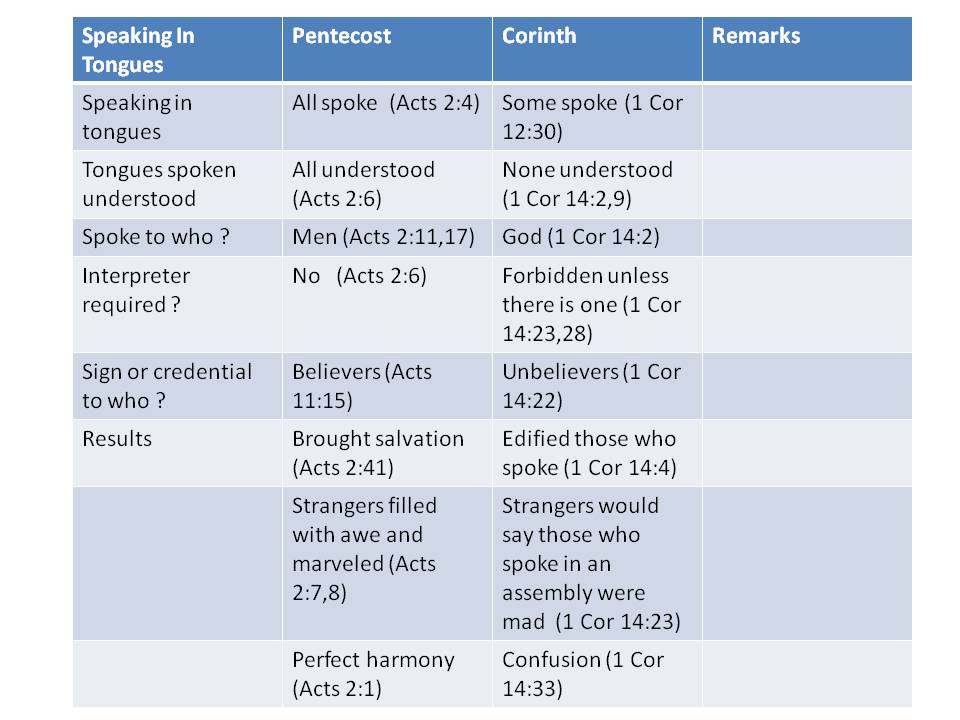Based on what you have written in the book, I agree TOTALLY with your arguments that essentially the miraculous gifts of the apostles have ceased and the special revelation given to the apostles has also ceased. You have also shown conclusively that cessationism was not a product of the Enlightenment and that prominent church leaders throughout history – Augustine, Martin Luther, John Calvin, Matthew Henry, John Owen, Thomas Watson, Jonathan Edwards, James Buchanan, Charles Spurgeon, Arthur Pink and D Martyn Lloyd-Jones – believed the same.
So I will be more of a cessationist than a continualist according to your definition based on your arguments. But I hope that you will also give careful thought to my argument for the exception that some gifts in the lesser sense may still be given.
The Gift Of Tongues.
I agreed with your argument that the intelligible tongues (such as those spoken at Pentecost) has ceased but I believe the unintelligible tongues has not. (1 Cor 13:1 makes mention of the tongues of angels – If I speak in the tongues of men and of angels, but have not love, I am a noisy gong or a clanging cymbal. This is not to be confused with the gibberish tongues spoken at will by the Charismatic Movement.)
There are 8 diametrically opposite differences between the tongues spoken at Pentecost and at Corinth in the chart shown below (with information gleaned from J Oswald Sanders, Spiritual Maturity) which seem to suggest that intelligible and unintelligible tongues were spoken at Pentecost and at Corinth respectively, and if it is true, there will be no contradiction in all the Scriptural references.
As such, I will not discount the possibility of the continuation of the unintelligible tongues. And I believe it is only given during times when the gospel is hard pressed today and I quote the champion of Sola Scriptura, Martin Luther.
“The signs here spoken of (Mark 16:17-18) are to be used according to need. When the need arises, and the gospel is hard pressed, then we must definitely do these signs, before we allow the gospel to be maligned and knocked down.” – Believer’s Bible Commentary.
(Mark 16:17-18. And these signs shall follow them that believe; In my name shall they cast out devils; they shall speak with NEW tongues; They shall take up serpents; and if they drink any deadly thing, it shall not hurt them; they shall lay hands on the sick, and they shall recover.
I noticed an interesting detail in Mark 16:17-18. Do the NEW tongues refer to the believers speaking unlearned tongues, i.e. known without being learned; or an unknown tongue altogether ? )

There is further similar argument for the possibility of unintelligible tongues continuing in the following link : https://www.gotquestions.org/continuationism.html
Continuationists suggest that part of the confusion over this topic is that there may be two kinds of “tongues” spoken of in Acts and the letters to the Corinthians. The gift that came on the day of Pentecost enabled the apostles to speak in the languages of those in attendance. This allowed the gospel to spread rapidly throughout the region (Acts 2:6-8). However, in 1 Cor 14, Paul seems to be speaking about a different purpose for tongues. The entire fourteenth chapter is an instruction to the church about the purposes and use of this gift, one of which may be for worshiping God (14:2, 14–16, 28).
Biblical support for this position is found in Acts 10:45-46 when Cornelius received the Holy Spirit. He began praising God in tongues, even though there was no one present who needed to hear the gospel in other languages. Another example is in Acts 19:6-7. Twelve men from Ephesus received the Holy Spirit and began to speak in tongues, although there was no one present who needed to hear it. The Corinthian church regularly included tongues in their worship services, with no indication that there were always those present who needed to hear a message in their language.
John Piper calls this form of tongues “one particular way of releasing the heart of praise.” In 1 Cor 14:28, Paul continues his instruction on the use of tongues in corporate worship: “If there is no interpreter, he must keep silent in the church; and let him speak to himself and to God.” This seems to imply that tongues can also be a means for praying “in the spirit,” which lends another perspective to passages such as 1 Cor 14:14-15 and 28, Rom 8:26, Eph 6:18, and Jude 1:20. Paul never chastised the Corinthians for using this gift (1 Cor 14:39) but only for misusing it and creating chaos (verses 23 and 39). He ends the fourteenth chapter by instructing them not to “forbid speaking in tongues” verse 39.
The Gift Of Prophecy.
Again, I believe the special revelation given to the apostles had ceased while the gift in the lesser sense can still continue. You have mentioned the principle of probability can be used to verify prophecy so all these prophecies in the lesser sense should not be despised but tested according to this principle of probability. Both Dr John Stott and Dr JI Packer did not discount the possibility. Again, this gift of prophecy concerning knowledge of coming calamities should not be confused with that practiced by the Charismatic Movement today which resembles individual and corporate fortune telling.
“God on occasion in Bible times communicated with some people by supernaturally telling them what to do, and He has not said He will never do so again. Some at least of the glowing stories that are told about guidance of this kind can hardly be doubted. Some see reason to deny that God ever did, or will communicate this way now that the canon of Scripture is complete, but that view seems to us to go beyond what is written and to fly in the face of credible testimony. It is not for us to place restrictions on God that He has not placed on Himself ! Certainly, no messages from God of this kind could be regarded as canonical in the sense of carrying authority for universal faith and life in the way Scripture does. This, however, is not to deny that “private revelations” as the Puritans used to call them, ever take place nowadays. On that question we keep an open mind. Though we know that self-deception here is very easy, we would not short-circuit claims to have received words from God; we would instead test them, as objectively and open-mindedly as we can, in light of the teaching Scripture itself. Scripture teaches the principle of testing in such passages as Deuteronomy 18:22 where God’s people are told to listen to supposed prophets with discernment: “When a prophet speaks in the name of the Lord, if the word does not come to pass or come true, that is a word that the Lord has not spoken; the prophet has spoken it presumptuously. You need not be afraid of him.” Similarly Paul instructs the church at Thessalonica in 1 Thessalonians 5:20-21, “Do not despise prophecies, but test everything; hold fast what is good.” – Dr JI Packer, “The JI Packer Classic Collections”
“…in the primary sense of prophets, as vehicles of direct and fresh revelation, it seems we must say that this charisma is no longer given. There is no longer anyone in the church who may dare to say, “The word of the Lord came to me, saying…” or “Thus says the Lord.” It has been argued, however, that prophets may be used in other and lesser senses. Some think there may be men today like the prophet Agabus (Acts 11:28; 21-10-11) whose function is not to add to revelation but to foretell some future event. This is possible. But both church history and personal experience make me cautious…” – John Stott, Baptism and Fullness.









